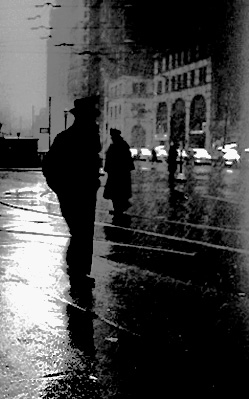I have just finished reading Peter Quinn’s Hour of the Cat (2005), a hard-boiled detective thriller in the Dashiell Hammet/Raymond Chandler mode set in 1938 New York (with some scenes set in Nazi Germany). It was delicious summer reading—very suspenseful and masterfully written—but there was something more to it. As I watched a German admiral wrestle with the rise of Hitler—the military appears ready to stage a coup but is then undercut by Neville Chamberlain’s capitulation on the Sudetenland issue—I suddenly sensed that I was reading a version of our own politics.
It’s as though the German military are moderate Republicans whose country/party has been taken over crazies. They are good principled men who feel helpless in the face of someone who takes reckless chances and always seems to win. They know that Hitler’s good luck won’t last forever but how does one stand up to a man who takes over Czechoslovakia without a shot being fired? The officers know that there is a reality out there that sooner or later that Germany will collide with, but Hitler & Company won’t acknowledge that this reality exists.
In Germany’s case, the reality is the allied nations, whose combined might will ultimately be more than Germany can handle. In our case, it’s global warming, energy scarcity, 10 million or so undocumented immigrants, and an exploding deficit. While Hitler is spinning wild conspiracy theories that have little relation to the world as it really is—Rush Limbaugh, the National Rifle Association, Grover Norquist, and Fox News are our own myth makers—the German military is paralyzed. Their few small gestures of opposition are used by Hitler as excuses for purges.
In some ways, however, what is happening in Germany is more to set an emotional mood than to provide the book’s action, which involves a private detective trying to save an innocent man from the electric chair. The more he digs into the case, the wider it gets, ultimately touching on the Nazi eugenics program and the gas that will be used in the concentration camps.
The sense of helplessness that the German military feels is a key part of book’s noir atmosphere. Everyone feels lost in a world that is dark and evil. Some noir film historians argue that the dark mode we see in Dashiell Hammet’s novels, in those dark post-World War II crime movies (like The Big Sleep), and in noir’s periodic revivals (Blade Runner, L. A. Confidential, Fargo) captures America’s recurring existential identity crisis. On a regular basis, it seems, we experience anguished confusion about what our country stands for and where it is going. This novel, written during the George W. Bush years, is picking up on our current malaise.
The hero, Fintan Dunne, is an ex-cop (as is Hammett’s Sam Spade) who has left the force because of police corruption. Virtually no one can be trusted—cops are on the take and are capable of murder, American Nazi sympathizers hold anti-semitic rallies, the FBI cares more about its reputation than about an innocent man facing execution, district attorneys (like Thomas Dewey) are out to polish their political resumes, and Republican politicians see Roosevelt as a socialist who should be impeached if he embroils the country in Europe’s troubles. Fin thinks that he can be safe by simply working as a private eye handling divorce cases, but ultimately (like Rick in Casablanca) his greater sense of integrity kicks in and he runs risks to insure that justice prevails. In American fiction, it seems, the theme of the reluctant hero never goes away.
So maybe this is one thing to carry away from such works of noir fiction: as forbidding as the political landscape may look, ultimately we can’t retreat into our private worlds. The fate of the country always rests with us, and even when things seem hopeless, even when it appears that the lunatics are running the asylum, we must make principled stands and let the chips fall where they will. Scratch a noir crime novel like Hour of the Cat deep enough and you’ll find a romantic soul.
Call it a belief in American democracy.
